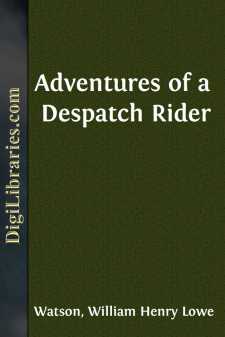Categories
- Antiques & Collectibles 13
- Architecture 36
- Art 48
- Bibles 22
- Biography & Autobiography 813
- Body, Mind & Spirit 142
- Business & Economics 28
- Children's Books 17
- Children's Fiction 14
- Computers 4
- Cooking 94
- Crafts & Hobbies 4
- Drama 346
- Education 46
- Family & Relationships 57
- Fiction 11829
- Games 19
- Gardening 17
- Health & Fitness 34
- History 1377
- House & Home 1
- Humor 147
- Juvenile Fiction 1873
- Juvenile Nonfiction 202
- Language Arts & Disciplines 88
- Law 16
- Literary Collections 686
- Literary Criticism 179
- Mathematics 13
- Medical 41
- Music 40
- Nature 179
- Non-Classifiable 1768
- Performing Arts 7
- Periodicals 1453
- Philosophy 64
- Photography 2
- Poetry 896
- Political Science 203
- Psychology 42
- Reference 154
- Religion 513
- Science 126
- Self-Help 84
- Social Science 81
- Sports & Recreation 34
- Study Aids 3
- Technology & Engineering 59
- Transportation 23
- Travel 463
- True Crime 29
Adventures of a Despatch Rider
Description:
Excerpt
CHAPTER I.
ENLISTING
At 6.45 p.m. on Saturday, July 25, 1914, Alec and I determined to take part in the Austro-Servian War. I remember the exact minute, because we were standing on the "down" platform of Earl's Court Station, waiting for the 6.55 through train to South Harrow, and Alec had just remarked that we had ten minutes to wait. We had travelled up to London, intending to work in the British Museum for our "vivas" at Oxford, but in the morning it had been so hot that we had strolled round Bloomsbury, smoking our pipes. By lunch-time we had gained such an appetite that we did not feel like work in the afternoon. We went to see Elsie Janis.
The evening papers were full of grave prognostications. War between Servia and Austria seemed inevitable. Earl's Court Station inspired us with the spirit of adventure. We determined to take part, and debated whether we should go out as war correspondents or as orderlies in a Servian hospital. At home we could talk of nothing else during dinner. Ikla, that wisest of all Egyptians, mildly encouraged us, while the family smiled.
On Sunday we learned that war had been declared. Ways and means were discussed, but our great tennis tournament on Monday, and a dance in the evening, left us with a mere background of warlike endeavour. It was vaguely determined that when my "viva" was over we should go and see people of authority in London....
On the last day of July a few of us met together in Gibson's rooms, those neat, white rooms in Balliol that overlook St Giles. Naymier, the Pole, was certain that Armageddon was coming. He proved it conclusively in the Quad with the aid of large maps and a dissertation on potatoes. He also showed us the probable course of the war. We lived in strained excitement. Things were too big to grasp. It was just the other day that 'The Blue Book,' most respectable of Oxford magazines, had published an article showing that a war between Great Britain and Germany was almost unthinkable. It had been written by an undergraduate who had actually been at a German university. Had the multitudinous Anglo-German societies at Oxford worked in vain? The world came crashing round our ears. Naymier was urgent for an Oxford or a Balliol Legion—I do not remember which—but we could not take him seriously. Two of us decided that we were physical cowards, and would not under any circumstances enlist. The flower of Oxford was too valuable to be used as cannon-fodder.
The days passed like weeks. Our minds were hot and confused. It seemed that England must come in. On the afternoon of the fourth of August I travelled up to London. At a certain club in St James's there was little hope. I walked down Pall Mall. In Trafalgar Square a vast, serious crowd was anxiously waiting for news. In Whitehall Belgians were doing their best to rouse the mob. Beflagged cars full of wildly gesticulating Belgians were driving rapidly up and down. Belgians were haranguing little groups of men. Everybody remained quiet but perturbed....


